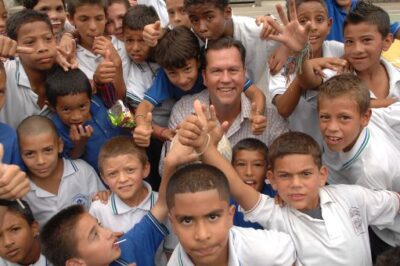Though relatively unknown in the U.S., OneHope has the audacious goal of reaching 4.2 billion young lives with the gospel by 2030—and is well on its way. For Rob Hoskins, though, dreaming big is all he’s ever known.
Tiffany led her newfound Christian friends deep into the slums of Chorrillos, Peru, to meet her family. Along the way, the 13-year-old held tightly to her Book of Hope, a version of the gospels that missionaries had just placed in her hands. Despite living in extreme poverty, Tiffany welcomed these outsiders to her humble home. But when the missionaries arrived there, they found a devastating scene: builders repossessing the roof and an abusive alcoholic father laying in wait.
“I wanted to pull her out of there, bring her back to America and literally put a roof over her head,” recalls Rob Hoskins, president of OneHope, a global ministry to youth and children based in Pompano Beach, Fla. “I wanted to take her away from that abusive father. But I had to believe the gospel was enough.”
Indeed, the gospel was more than enough. Tiffany brought her mother to Christ that same night. Shortly after, Tiffany’s brother and sister accepted Jesus. Eventually her abusive father surrendered his life—and his alcohol—to the Lord. Tiffany and her whole household were saved.
That would’ve been a happy enough ending for Tiffany, but the story doesn’t end there. Despite a pharmaceutical technology degree that could have taken her out of the slums for good, Tiffany prayerfully decided to stay in Chorrillos. She founded a Christian preschool to deliver the gospel to the next generation of slum kids. And her rehabilitated father is her right-hand man.
“When we went back to Chorrillos and saw how the gospel had transformed Tiffany’s life and family—and how it was impacting her community—I just started weeping,” says a teary-eyed Hoskins. “Thank God I didn’t take her out of that slum. She is the shining light of Chorrillos. The good news of Jesus Christ changed the child—and changed her abuser. Only the gospel can do that.”
Reaching 4.2 Billion Tiffanys
Hoskins can tell story after story about children like Tiffany who received the Book of Hope. But the 47-year-old leader isn’t satisfied with the literal millions of stories like Tiffany’s. Through OneHope, he wants to change the destiny of billions of children and youth by 2030.
Tears fill Hoskins’ eyes when he talks about the broken children he’s met on his quest to put God’s Word into the hands of 4.2 billion youth in the next 18 years as part of OneHope’s Vision 2030. But joy fills his heart when he talks about the gospel’s restorative power in the millions of souls, like Tiffany and her family, already saved.
Vision 2030 lays the groundwork for a church movement with the capacity to not only reach 1 billion kids for Jesus every seven years, but eventually reach every child on the planet within two decades. To date, the ministry formerly known as Book of Hope has already touched more than 860 million young lives and in recent years has seen exponential growth in hot spots such as Russia and India.
Vision 2030 is nation-changing and history-making in the truest sense of the words. Hoskins explains the plan by likening it to the Transcontinental Railroad, the first safe way to cross the United States. Known as the greatest engineering feat of the 19th century, the railroad made possible America’s dream of “Manifest Destiny”: one nation united across a continent.
“I was praying about the enormity of reaching 4.2 billion children, many in closed countries. I was overwhelmed,” admits Hoskins, who grew up on the mission field in the Middle East. “In the middle of the night the Lord woke me up and reminded me of the Transcontinental Railroad. We have to lay a track that catalyzes a movement within the church to reach those 4.2 billion children. We have to move into our Manifest Destiny of the Great Commission.”
In the Beginning …
A ticker on OneHope’s website counts how many children and youth are receiving God’s Word through the global ministry. The number climbs by two or three every second, and OneHope predicts 91.8 million kids will engage with God’s Word through its outreaches this year alone, while partners in other nations will reach millions more.
Launched as Book of Hope in 1987, the ministry’s first Scripture-engagement mission went to almost 1 million children. Bob Hoskins, Rob’s father and the founder of Book of Hope, describes a prophetic vision in which he saw Satan working to destroy an entire generation. He says he saw child soldiers, child sex slaves, poverty, violence, diseases, alcohol and drug abuse, and suicide.
“For days I was weeping over what I saw and asking God, ‘Why have I seen this? What I am to do?’” recalls Bob, who was then president of Life Publishers, one of the largest Bible publishers. “During a time of fasting and prayer, God spoke to me. He said, ‘The only thing that will rescue this generation are the truths found in My Word. I want you to take My Word to the children of the world and you’ll do it through leaders.’”
Bob gathered the names of the 50 most powerful leaders in Latin America—presidents, prime ministers, heads of banks and the like—and sent them a leather Bible embossed with their names in gold and a letter challenging them to use God’s Word as a map for their nation. That heavenly strategy has opened the doors to many nations, starting with El Salvador in 1987.
“El Salvador requested a Bible for every child in the nation. I sent a message immediately and promised to send them. I didn’t even know how many children were there,” Bob recalls. “When I found out there were 1 million children, I really started fasting and praying!”
Bob put the story of Jesus in chronological order and called it Book of Hope. His publishing connections allowed him to print three books for $1. That birthed the ministry and, 25 years later, it only costs 33 cents to give a child God’s Word.
Penetrating Closed Nations
“OneHope is probably the best-kept secret in the American ministry world,” says Phil Cooke, a media maven who has worked with the likes of Billy Graham, Oral Roberts, Joyce Meyer and Joel Osteen. “Governments trust them and that gives them entree into places many ministries could never hope to go.”
This remains true today as OneHope penetrates closed nations the same way it did with El Salvador: by building relationships with national leaders. In Muslim nations, Bob meets with leaders to position Jesus as one of the greatest teachers, one who can shape values and character. That approach opens doors for OneHope to bring its materials to religious education classes for the Christian minority. Muslims trickle in by invitation of Christian classmates because the materials are culturally relevant and compelling.
In communist countries, OneHope often works through local churches to gain entry into the society. Then there are the numerous stories of God miraculously opening doors, such as when Bob, a cancer survivor, met a government leader who had also overcome the disease. Their shared personal experience led to an invitation for OneHope to work in that nation.
But ultimately, Bob says it’s OneHope’s research model, which identifies and offers programs to solve the nations’ youth crises, that demands the attention of even government leaders who shun the one true God.
“We take our research statistics to governments and they see the tragic situation of their children,” Bob says. “Then we tell them we want to walk beside them and provide material that will help the children. They don’t believe Jesus is God but as historians and scholars they respect the moral teachings of Christ and welcome us into their schools.”
Modern Missiology Pioneers
OneHope is penetrating closed nations, and shifting missiology with its three-step research process: market research, program research and outcomes research.
“We set up a system and built a database to track what countries these kids are in and what languages they speak,” Rob says. “We look at things like literacy—what percentage can be reached with the printed word, what percentage has to be reached through oral communication and what percentage are alliterate, meaning they know how to read but prefer other media.”
Keeping in mind cultural relevance and each society’s unique problems, OneHope’s programs in Japan look much different than its programs in Madagascar.
For its outreach in Japan, OneHope collaborated with a local partner to address systemic issues in Japanese culture—suicide, social pressure to succeed, academic pressure from families and prostitution. In a Tokyo culture where beauty is valued above almost anything else, programs are based on Matthew 6, which discusses how we are more beautiful to God than flowers.
In Madagascar, reality involves HIV and witchcraft. Many Malagasy facing family problems dig up their ancestor’s bones and sleep with them. Because of this, OneHope’s program in Madagascar focuses on God’s character and His ability to meet every need—including solving family problems. Hoskins believes this combination of research and Holy Spirit-led programs is the means through which the gospel could reach a tipping point.
“The church has kept up miraculously with the population boom over the last 2,000 years,” Rob says. “When you look at population growth from an eschatological perspective, the population boom begins to dramatically decelerate around 2015. When you look at that through the lens of missiology, we see an opportunity to make inroads into the global population if the church continues to grow at its present pace.”
All About Outcomes
Those inroads must be followed by outcomes, however. In fact, Rob firmly believes we need a paradigm shift in 21st-century missiology from the pioneer mindset to more collaborative missions—a move from scattering gospel seed in large crusades to specialized ministries that focus on areas such as medicine or creative arts, and a shift from an output-based mentality to a outcome-based mentality.
It’s not about disseminating Scripture, Rob says; it’s about changing lives and cultures.
“If we hand out 100,000 books, were they read?” Rob asks. “If they were read, were they understood? If they were understood, did it change anything? Did it affect their beliefs and attitudes? Did it make an impact on society?”
Most of the time, the testimonies are heartwarming. Tiffany’s story epitomizes the promise of OneHope. But sometimes the results are devastating. Rob uses Swaziland as an example of the latter. On paper, the outreach in Swaziland looked picture perfect, yet despite the presence of many major ministries nothing was changing.
Swaziland has the world’s highest HIV/AIDS rate, with the United Nations reporting that it could become the first extinct nation in modern times. But the real gut-check came when Rob read a story in Swaziland’s morning paper about a teacher arrested for molesting a 7-year-old boy. It hurt his heart because OneHope uses teachers to teach students Scripture.
“What if that teacher was sharing our literature?” he asked with a lump in his throat. “What kind of testimony of Jesus is that?” Hoskins shut down the Swaziland program in 2006 to reassess the strategy. That was the beginning of the outcomes-based approach to ministry. He says it’s about being wise stewards, and his donors certainly appreciate the due diligence.
“If donors started evaluating most major ministries in America by outcomes, about a third of them would collapse within three months,” Cooke says. “Rob was one of the first to figure out the value in outcomes-based ministry and run with it on a large scale.”
Mart Green, founder and CEO of Mardel Christian Educational Supply and an heir to the Hobby Lobby family of companies, has been a OneHope donor for about 15 years. It was OneHope’s ability to reach three kids for a dollar that caught the attention of his business mind, yet it’s the proof of efficacy that has kept him donating.
“OneHope is shaping the next generation,” Green says. “OneHope is spiritually strategic, blending research with guidance from the Holy Spirit.”
The Tech Vehicle
That blend has also propelled OneHope into the forefront of ministries using innovative technology as a vehicle for the gospel. Bobby Gruenewald, pastor and innovation leader at LifeChurch.tv and the creator of the YouVersion Bible app, says OneHope has been an innovator for decades—including producing an animated movie about Christ’s life, The GodMan, viewed by more than 50 million kids. Gruenewald joined the board about a year ago to help the ministry push deeper into digital technologies, such as Scripture-engaged virtual worlds. As Rob sees it, a virtual world may not look like a missionary going out in a pith helmet and being martyred by a savage tribe but it’s just as critical for this generation.
OneHope’s latest innovation, “Adventus Island,” targets kids ages 5 to 9 in a massively multiplayer online (MMO) game that allows them to earn points for memorizing Scripture. “Adventus Island” uses digital technologies to enhance real-world experiences as one more manifestation of OneHope’s effort to serve the global church with relevant tools.
“OneHope isn’t afraid to try new things,” Gruenewald says. “If it doesn’t work, they’ll shut it down. If it works, they’ll keep doing it or expand it. That’s unique. A lot of organizations stay on a set path regardless of the outcomes. OneHope is constantly looking to adapt and change based on cultural context. Rob understands that one size does not fit all.”
Bringing It Home
“One size does not fit all” has been OneHope’s approach to successfully impacting the youth in foreign nations—which has been the ministry’s primary focus for this stateside ministry. But after 25 years, the ministry is now looking into its own backyard.
“We used to think maybe there’s no need for OneHope in America,” Rob says. “But increasingly we’re finding this resonance for outcome-based ministry and collaboration and specialization. American children growing up in this generation absolutely do not have a biblical worldview. We are beginning to feel that call here.”
George O. Wood, general superintendent of the Assemblies of God—OneHope’s denominational covering until a few years ago—is confident that the ministry will fulfill God’s will, whether stateside or abroad. He says OneHope’s ability to cross denominational lines represents a manifestation of Jesus’ prayer for church unity in John 17. “Bob Hoskins has always been a visionary leader. Rob is walking in his father’s footsteps and growing the ministry,” Wood says. “It’s a strong example of a well-executed generational transfer.”
And it’s a generational transfer the Hoskins family hopes to see continue reaching billions of kids until Jesus’ return. Despite the grandiose vision, Rob doesn’t pray for money. Despite the huge task at hand, he doesn’t look at the global challenge through overwhelmed eyes. After being miraculously healed from terminal blindness, the deadliest-ever E. coli outbreak and prostate cancer, Rob has the trust of a child in the soul of a man who has laid his life down for Christ.
“We pray two simple prayers over our lives here,” he says. “First, we pray for God to keep our hearts and motives pure, because if we lose that we lose everything; we lose God’s Spirit. We also pray for the laborers. We pray for the people we need to become part of this OneHope vision of catalyzing a movement to reach every child and youth in the world with God’s Word.”
Jennifer LeClaire is news editor for Charisma. She visited OneHope’s headquarters to file this report.







Leave a Comment
You must be logged in to post a comment.